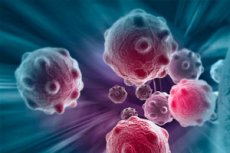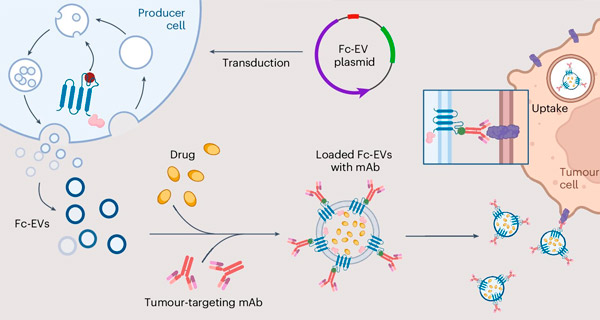Nye publikasjoner
Exosomer med antistoffer for målrettet kreftbehandling
Sist anmeldt: 02.07.2025

Alt iLive-innhold blir gjennomgått med medisin eller faktisk kontrollert for å sikre så mye faktuell nøyaktighet som mulig.
Vi har strenge retningslinjer for innkjøp og kun kobling til anerkjente medieområder, akademiske forskningsinstitusjoner og, når det er mulig, medisinsk peer-evaluerte studier. Merk at tallene i parenteser ([1], [2], etc.) er klikkbare koblinger til disse studiene.
Hvis du føler at noe av innholdet vårt er unøyaktig, utdatert eller ellers tvilsomt, velg det og trykk Ctrl + Enter.

Forskere ved Karolinska Institutet i Sverige har klart å levere en målrettet kreftbehandling ved hjelp av små membranvesikler som celler bruker for å kommunisere. Studien, «Antibody-loaded exosomes for targeted cancer therapy», publisert i tidsskriftet Nature Biomedical Engineering, viser at behandlingen reduserer tumorvekst og forbedrer overlevelse hos mus.
Når cellene våre kommuniserer, sender de ut små membranbobler kjent som ekstracellulære vesikler, som inneholder forskjellige signalmolekyler. Interessen for disse små boblene, noen ganger kalt kroppens «flaskebudskap», har økt de siste årene fordi de kan brukes til å levere medisiner.
Antistoffer retter seg mot svulster
Forskere ved Karolinska Institutet har laget en målrettet kreftbehandling ved å fylle disse boblene med et cellegiftmiddel og feste tumormålrettede antistoffer til overflaten deres. I tillegg til å målrette tumorceller, fungerer antistoffene også som en form for immunterapi, noe som forsterker den terapeutiske effekten. Behandlingen reduserte tumorvekst og forbedret overlevelse når den ble gitt til mus med brystkreft eller melanom.
«Ved å feste forskjellige antistoffer til ekstracellulære vesikler kan vi målrette dem mot nesten hvilket som helst vev og fylle dem med andre typer legemidler», sier Oskar Wiklander, lege og forsker ved Institutt for laboratoriemedisin ved Karolinska Institutet og en av de første forfatterne av studien sammen med Doste Mamand, forsker ved samme avdeling. «Behandlingen kan dermed brukes mot andre sykdommer og krefttyper.»

Konstruksjon av celler for å produsere vesikler med et antistoffbindende motiv spesifikt for Fc-domenet. Kilde: Nature Biomedical Engineering (2024). DOI: 10.1038/s41551-024-01214-6
Mer effektiv behandling med færre bivirkninger
Håpet er at den nye behandlingen vil være mer spesifikk og effektiv i å drepe tumorceller, samtidig som den skåner friskt vev enn dagens behandlingsstrategier. Forskerne planlegger å studere om ulike kombinasjoner av antistoffer og legemidler kan forbedre behandlingen ytterligere.
«Vi ønsker spesielt å undersøke muligheten for å levere mRNA som et legemiddel mot kreft», sier studiens siste forfatter, Samir El Andaloussi, professor ved Institutt for laboratoriemedisin ved Karolinska Institutet.
«Til syvende og sist håper vi at dette vil føre til en ny behandlingsplattform som kan forbedre behandlingseffektiviteten og redusere bivirkninger ved vanskelig behandlelige sykdommer, spesielt kreft.»
